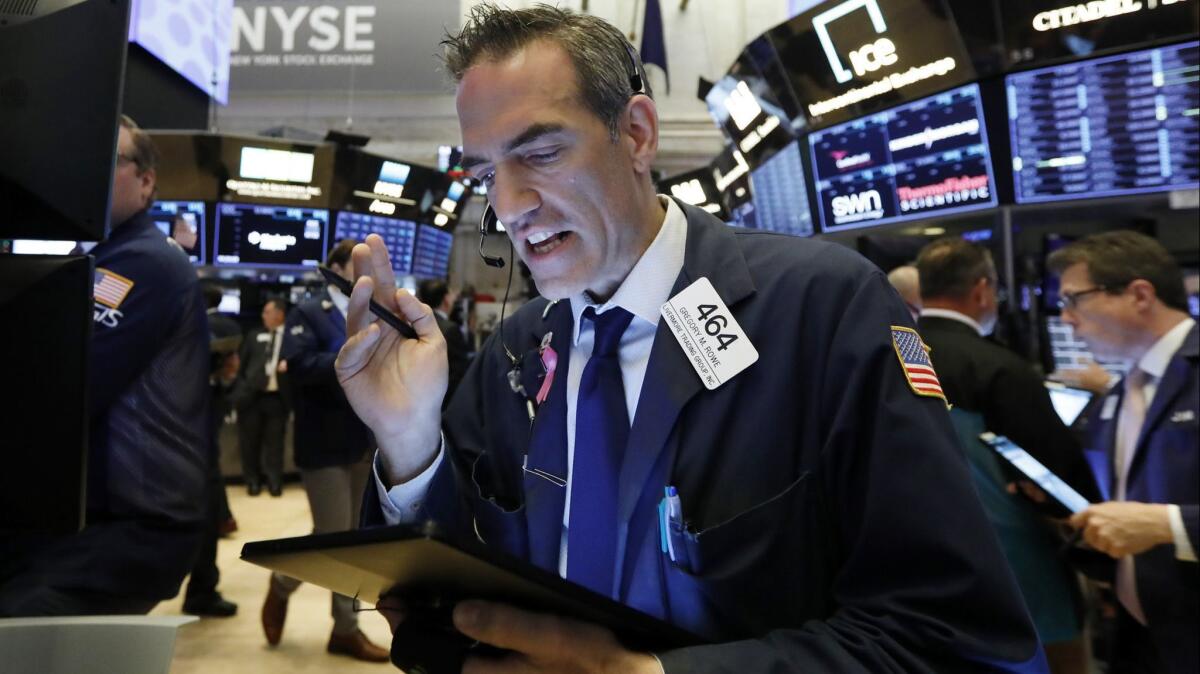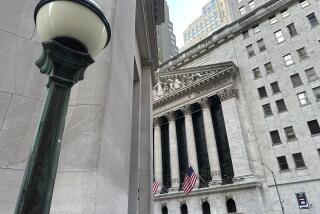Stocks close lower on Wall Street as bond-yield inversion stokes recession fears

- Share via
Another round of selling gripped Wall Street on Wednesday as nervous investors fled healthcare, technology and other high-risk stocks in favor of the safety of bonds.
The broad selloff, which lost some momentum in the last hour of trading, keeps the market on track for its fourth consecutive weekly loss and its first monthly drop this year.
The latest market slide comes as investors worry that the trade war between the U.S. and China will derail global economic and corporate profit growth as it drags on with no sign of a resolution.
Lower bond yields are typically a sign that traders feel uneasy about long-term growth prospects and would rather put their money into safer holdings, driving up their price but lowering their rate of return.
“This is just a bit of a retrenchment with this realization that this trade issue may take longer to resolve that we previously thought,” said Jeff Kravetz, regional investment director for U.S. Bank Wealth Management. “That’s giving concern that there is going to be lower economic growth going forward.”
The yield on the benchmark 10-year Treasury note held steady at 2.26%, the lowest level in nearly two years. It fell as low as 2.18% during the day.
The 10-year Treasury note remained below the yield on the three-month Treasury bill. When that kind of “inversion” in bond yields occurs over an extended period of time, economists fear it may signal a recession within the coming year. It has happened multiple times so far this year.
The S&P 500 index fell 19.37 points, or 0.7%, to 2,783.02. The index had been down 1.3% earlier. The Dow Jones industrial average lost 221.36 points, or 0.9%, to 25,126.41. It had tumbled 409 points.
The Nasdaq composite slid 60.04 points, or 0.8%, to 7,547.31. The Russell 2000 index of small companies dropped 14.07 points, or 0.9%, to 1,489.95. Major stock indexes in Europe also fell.
With two more trading days left in May, the S&P 500 is heading for a loss of 5.5%. That would be its first monthly loss since December. The market has been heading steadily lower this month as prospects for the economy have dimmed and traders have gotten worried about the lingering trade feud between Washington and Beijing.
In early May, the U.S. and China concluded their 11th round of trade talks with no agreement. The U.S. then more than doubled duties on $200 billion in Chinese imports, and China responded by raising its own tariffs.
The market’s monthlong slump follows a yearlong run for the S&P 500 that culminated in an all-time high April 30. The benchmark index is still up around 11% for the year, while the technology-heavy Nasdaq composite is up more than 13%.
Investors trying to wait out the worsening trade situation between the U.S. and China are facing “tariff exhaustion,” said JJ Kinahan, chief marketing strategist at TD Ameritrade.
China’s recent threat to use its supply of rare earths as a weapon is a worrying escalation, he said. Rare earths are chemical elements that are crucial to many modern technologies, such as consumer electronics, and China is a major supplier.
“What it shows to me is that there is a little bit of a worsening relationship here,” he said. “They went pretty deep in the bag to throw out something that would hurt.”
On Wednesday, traders continued to hammer technology stocks, which stand to suffer heavily in a prolonged trade war. Chipmaker Advanced Micro Devices fell 3.2%.
Healthcare and communications companies also bore a big share of the losses. Johnson & Johnson slid 4.2% and Google parent Alphabet dropped 1.7%.
The slide in bond yields, which make loans less profitable, continued to hurt banks and other financial stocks Wednesday. American Express fell 1%.
The wave of selling also snared many big retailers.
Abercrombie & Fitch plummeted 26.5% in heavy trading and Canada Goose, which makes luxury down coats, plunged 30.9% after both companies issued weak sales forecasts. Capri Holdings, which owns Versace and Michael Kors, slid 9.8% after its own forecast also disappointed investors.
Energy futures ended mostly lower. Benchmark U.S. crude fell 0.6% to settle at $58.81 a barrel. Brent crude, the international standard, closed 0.9% lower at $69.45 per barrel.
Wholesale gasoline slid 0.6% to $1.95 per gallon. Heating oil dropped 1.3% to $1.97 per gallon. Natural gas rose 2% to $2.63 per 1,000 cubic feet.
Gold gained 0.3% to $1,281 per ounce, silver added 0.6% to $14.41 per ounce and copper fell 1.2% to $2.66 per pound.
The dollar fell to 109.46 Japanese yen from 109.48 yen on Tuesday. The euro weakened to $1.1133 from $1.1165.
More to Read
Inside the business of entertainment
The Wide Shot brings you news, analysis and insights on everything from streaming wars to production — and what it all means for the future.
You may occasionally receive promotional content from the Los Angeles Times.









